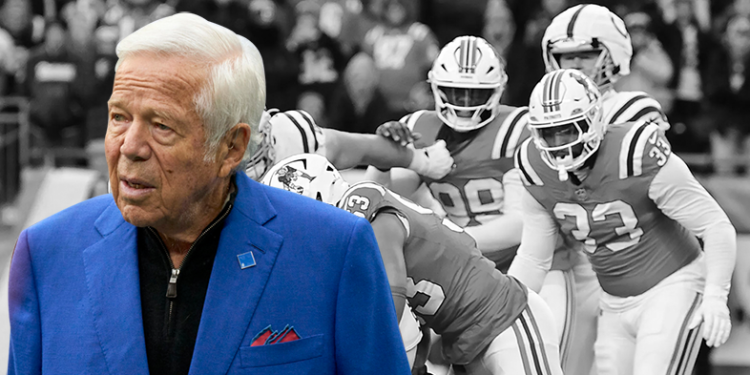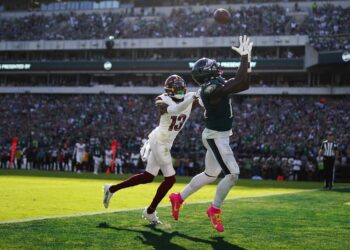The New England Patriots have a Robert Kraft problem, and there’s no denying it anymore.
For almost three decades Robert Kraft did what nearly all great owners do and stayed away from football operations. Whether it was Parcells, Pete Carrol to a lesser extent, or the 24-year reign of Belichick, Kraft made a habit of empowering his head coach to make every decision that affected the New England Patriots on-field product. From free agency to the draft to scouting and coaching, the head coach was omnipotently in charge of, and responsible for, Robert Kraft’s football team. This strategy worked out to the tune of 10 Super Bowl appearances, six Lombardi Trophies, and saw the Patriots organization become the gold standard for every professional sports franchise, worldwide.
During those 30-ish years, Kraft spent all the time he saved by not dabbling in on-field matters building Gillette Stadium (with his own money), building Patriot Place, negotiating TV deals with the NFL, ending the 2011 lockout, and about a million other things that generated revenue and drove up the value of his franchise, and the league as a whole.
Simply put, the separation of church and state, or in this case, the separation of the football team and the business side of the New England Patriots organization was working perfectly. Sure, having Bill Belichick and Tom Brady makes it infinitely easier for an owner to stay out of football activities, but the overwhelming majority of owners wouldn’t be able to help themselves and would find a way to exert some influence over the on-field team from time to time, but, to his credit, Robert Kraft never did that.
So what’s the problem I mentioned in the first sentence of this blog? It’s simple. Somewhere along the line, Robert Kraft started to believe that he was partially responsible for the success of his team beyond hiring Belichick and staying out of the way. To Kraft, his undeniable ability to be a shroud businessman with an eye for talent was tangentially responsible for his Patriots winning championships. For years the debate was about whether it was Brady or Belichick who was most responsible for the success of the Patriots with most fans thinking the split was somewhere around 50-50. In Kraft’s eyes though, it was a holy trinity of Brady, Belichick, and Kraft who were responsible for the dynastic run. Sure, he’d probably concede that Bill and Tom were more important than him when it came to on-field success (an important distinction I’ve made multiple times so far and will again), but I’d wager that in his mind the split was somewhere around 40-40-20 for Brady, Belichick, and Kraft respectively and the last 5 years have shown us that’s just not the case. Robert Kraft is an incredible businessman, but his assertion, whether spoken or just thought, that he was responsible for any part of the on-field product is akin to Belichick and Brady thinking they were responsible for Patriot Place. Sure, the mall at 1 Patriot Place wouldn’t exist without their on-field success, but they had no hand in actually making it happen the same way that Kraft had no hand in winning games aside from hiring Belichick 24 years ago.
Where and when things changed for Kraft is impossible to define, and one can only assume it’s like falling in love. It happens over time, but once it happens, it’s undeniable. Hell, Kraft had the Apple TV series, The Dynasty, produced in part so he could tell his side of the story, and let’s just say the mini-series didn’t sway the court of public opinion in his favor and actually may have done the opposite, but I’ll stick with more tangible facts in this blog. So instead of worrying about when the change happened, let’s take a look at three decisions and some philosophical thinking that support my thesis that the Patriots have a Robert Kraft problem.
The first poor decision that Kraft made was choosing Belichick over Brady. On March 17, 2020, Tom Brady announced that he’d be leaving the New England Patriots after 20 seasons. In the days after Brady’s announcement details of the separation started to leak and we all found out that Brady met with Kraft, the two had a conversation about the state of the franchise, specifically Bill Belichick’s tactics and demeanor, and Kraft let Brady walk ostensively picking Belichick over Brady. Kraft believed that Brady and Belichick were both equally as responsible for all the winning the Patriots did in the preceding 19 years and since Tom only had a few years of playing left, Kraft chose to stick with his head coach who would be around longer. We all know how this decision ended. Brady went to Tampa and won another Super Bowl while the Patriots went 7-9, 10-7, 8-9, and 4-13 in the four seasons Bill coached the team after Brady’s departure before he was fired. The shroud businessman with a self-proclaimed talent for identifying talent and empowering the right people was painfully wrong in his first big football-related decision since hiring the very man he fired in 2000.
The second mistake that Kraft has made is more of a philosophical one. Kraft doesn’t spend money. As this Reddit article explains, the Patriots are 31st out of 32 teams in real cash spending since Kraft bought the team. Sure, there are some years that the Patriots ranked inside the top 10 in real cash spending, but a 30-year sample size is far more indicative of a spending strategy than any particular year, and this was no secret to Bill. After Belichick was fired, he was quick to point this out, implying that he’d have liked to spend more money but was handcuffed by his owner. From Rober Kraft’s perspective, I can understand his hesitancy to spend after watching his franchise win six Super Bowls without spending the kind of money other, lesser, teams did but with hindsight being 20/20, we can all now agree that Brady’s unmatched talent covered all sorts of shortcomings with Kraft’s spending being a major one.
Piggybacking on the #KraftIsCheap and #BradyCoveredForEverything narratives, I think the annual Players Association team report card is worth discussing. Every year the NFLPA anonymously polls its players asking questions about the amenities their teams provide. The answers are aggregated, letter grades are assigned, and the organization’s amenities are ranked. The Patriots rank in the goddamn basement in almost every category and 29th overall. This can be easily fixed with greater investment from ownership in both football-support staff and their physical building, a move Kraft has finally made after years of poor survey results. A step in the right direction, but they’re digging out of a substantial hole.
After the dismissal of Belichick this past January, Kraft was in the position to totally turn the page from the Brady/Belichick era and select a head coach/GM to lead the Patriots, and their new quarterback they’d be selecting with the third pick in the draft, for the next decade or more. Kraft’s decision to stick with Belichick over Brady backfired, but with Brady retired and Belichick gone, any ties to the dynasty were perfunctory at best, and the Patriots were an organization in desperate need of a true reset. From the outside, the Patriots coaching job would have been an intriguing opportunity. The Patriots’ 2023 defense was a solid unit, they had tonnes of cap space and, as mentioned, a top-three pick in the 2024 draft that was quarterback heavy so any coach taking the job would have had a few solid pieces to work with. Instead of interviewing external coaching options, Kraft handed the job to Jerrod Mayo who had all of 5 years of coaching experience before getting this job. The Patriots front office did not interview a single outside candidate for the position and as we’ve come to find out, Kraft had given Mayo the Job, in writing, years ago after Mayo impressed Kraft on a pilgrimage to Isreal. Seriously. When pressed on his decision-making, Kraft explained that he has been successful in nurturing and promoting from within in his other businesses and that he liked Mayo’s experience within the Patriots organization. After handing Mayo the job, conventional wisdom would dictate hiring experienced coordinators who can take a lot of the day-to-day responsibilities off of the rookie coach’s plate while he acclimated to his new role. Nope. They hired Demarcus Covington, the Patriots’ existing defensive line coach, to be the defensive coordinator and ended up with Ale Van Pelt as their offensive coordinator after a handful of candidates flat-out refused an interview while others declined the job for monetary reasons. The Patriots entered 2024 with a rookie head coach, rookie defensive coordinator, and a journeyman offensive coordinator who had never called plays before. The results have been predictably bad despite the assertion of Drake Maye who looks to be the real deal.
As we sit here in early December, the New England Patriots are 3-10, have been eliminated from playoff contention, and have lost five games by six points or less, two in overtime, and had realistic if not favorable chances to win four of those games. In each defeat, Jerrod Mayo has made at least one head-scratching decision that directly led to the defeat. After each soul-crushing loss, Mayo steps to the podium and says something along the lines of “We have to be better,” but with just four games left, we’ve yet to see any improvement and a 3-14 record is very possible. Should the Patriots end the season at 3-14 or 4-13, I’d like to think Robert Kraft will take a long look in the mirror and decide whether to hang on to any piece of the past and use his intuition that has helped him become a multi-billionaire is more important than having the right person leading his football team. Once again, the Patriots’ job will be a desirable one. Drake Maye looks to be the real deal and is under a cost-controlled contract for the next four seasons, the team again has a ton of cap space, and will have a top 5 pick in this draft to address any number of needs. The Patriots are not a good team as currently constructed, but have enough of the right pieces, and cap space, to turn things around quickly. Whether or not the turnaround happens, though is dependent on Kraft’s ability to let go of the past, and admit his mistakes instead of doubling down on them, and spending money. Three things that have proven troublesome for Kraft during the post-Brady years and probably before that.




